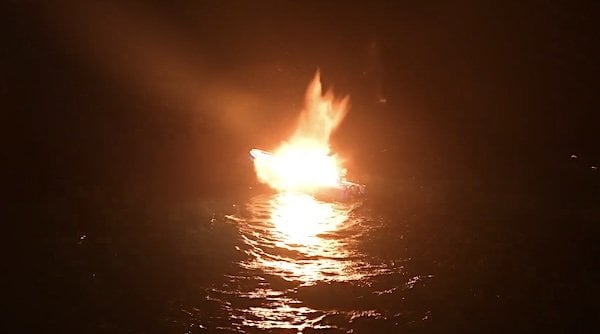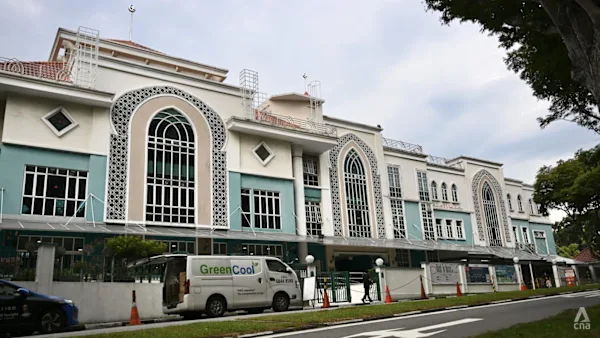Copyright wnd

On September 2, U.S. armed forces struck an identified narco-terrorist fast boat in international waters transiting at high speed in the Caribbean Sea. The vessel reportedly carried on board eleven persons who were members of Tren de Aragua (TdA), a designated terrorist organization under U.S. law. Secretary of State Marco Rubio said the attack occurred in the “Southern Caribbean” against the vessel, which had “departed from Venezuela.” The boat was destroyed, presumably by a missile, killing everyone on board. On September 15, the United States destroyed a second boat operated by drug trafficking cartels. The next day, President Trump said,” We knocked off, actually three boats – not two – but you saw two.” We suggest these attacks are a lawful exercise of the president’s powers under the U.S. Constitution and U.S. law, and consistent with the international law of self-defense. The Threat of Tren de Argua TdA suddenly appeared as an imminent threat in the United States as part of a massive surge of 1.5 million Venezuelans that entered the country during the previous administration. TdA is not just a violent drug gang involved in mafia-like tactics like taking over apartment complexes and trafficking in guns, drugs, and humans, and committing rape, torture, murder, and robbery. The organization is also a state-sponsored tool of asymmetric warfare – connected to the regime of Venezuela’s Nicolas Maduro, a blended organization encompassing the state with non-state actors. The White House claimed TdA is “undertaking hostile actions and conducting irregular warfare against the territory of the United States both directly and at the direction, clandestine or otherwise, of the Maduro regime in Venezuela.” Nicolas Maduro is believed to be the leader of the Cartel de los Soles (Cartel of the Suns), a Specially Designated Global Terrorist group that provides material support “to foreign terrorist organizations threatening the peace and security of the United States, namely Tren de Aragua and the Sinaloa Cartel.” Intercepted communications indicate TdA functions as enforcers for the Maduro regime. TdA is a hemispheric threat working with cartels in Mexico and Colombia. These relationships hold terrifying potential. Mexican cartels, for example, are in Ukraine to learn first person view (FPV) drone warfare, drone manufacturing, electronic warfare, and real-time battlefield coordination on the front lines to carry their lethal skills back home. Colombian cartels are present in Ukraine as well, as the country has become an inadvertent training ground for the most dangerous terrorists in the Western Hemisphere. In April of this year, the Wall Street Journal reported that a Colombian police Black Hawk helicopter in Antioquia was blown out of the sky by a drone operated by a drug trafficking gang. From April 2024 to August 2025, Colombian cartels conducted 301 strikes with unmanned aerial vehicles, two-thirds of them in Cauca and Norte de Santander provinces, killing 22 soldiers and police officers. TdA is a Designated Terrorist Organization TdA, operating both within and outside the United States, presents an unusual and extraordinary threat to the national security, foreign policy, and economy of the United States and other nations in the Western Hemisphere. The Department of State reports that “TdA is a transnational organization that originated in Venezuela with cells in Colombia, Peru, and Chile, with further reports of sporadic presence in Ecuador, Bolivia, and Brazil. The group is a complex and adaptive system characteristic of organizations engaged in insurgency and asymmetric warfare. This brutal group has conducted “kidnappings, extorted businesses, bribed public officials, authorized its members to attack and kill U.S. law enforcement officials, and assassinated a Venezuelan opposition figure.” Consequently, TdA and other international cartels and other transnational organizations “constitute a national security threat beyond that posed by traditional organized crime.” On February 20, 2025, TdA was designated a Foreign Terrorist Organization under Section 219 of the Immigration and Nationality Act (8 U.S.C. § 1189), as amended, which authorizes the Secretary of State to designate entities that engage in terrorist activities posing a significant risk to U.S. national security or citizens. Additionally, the group was designated a Specially Designated Global Terrorist (SDGT) organization on July 24, 2025, under Executive Order 13224, which targets terrorist groups and their supporters. Trump Administration’s Rationale After the first strike, President Trump announced on social media platform Truth Social: Earlier this morning, on my orders, U.S. Military Forces conducted a kinetic strike against positively identified Tren de Aragua Narco-terrorists in the SOUTHCOM area of responsibility. TDA is a designated Foreign Terrorist Organization, operating under the control of Nicolas Maduro, responsible for mass murder, drug trafficking, sex trafficking, and acts of violence and terror across the United States and Western Hemisphere. The strike occurred while the terrorists were at sea in international waters transporting illegal narcotics, heading to the United States. The strike resulted in 11 terrorists killed in action. No U.S. forces were harmed in this strike. Please let this serve as notice to anybody even thinking about bringing drugs into the United States of America. BEWARE! Thank you for your attention to this matter!!!!!!! White House Deputy Chief of Staff Stephen Miller explained that the regime in Venezuela is a narco-trafficking drug cartel running Venezuela. “For generations, we used our military to engage in action against terrorists in the Middle East and in Africa while leaving unharmed the terrorists in our own hemisphere, who are responsible for so many more American deaths, who have spilled so much blood across the Western hemisphere, who have bereaved so many parents and families, and who have contributed to such a horrific cycle.” He went on to say Venezuela is “working directly with” cartels in Mexico and Colombia that are murdering American citizens, importing drugs and guns into the United States. These terrorists are responsible for “so much more [sic] American deaths” than the conflicts overseas. To address this threat, “President Trump is finally allowing and directing the United States military to use its authorities under the Constitution to defend America from the terrorist organizations that have run free for too long in our own hemisphere.” In a letter sent to Senator Charles Grassley in compliance with the War Power Resolution, President Trump explained that “[e]xtraordinarily violent drug trafficking cartels…have wrought devastating consequences on American communities for decades, causing the deaths of tens of thousands” of American citizens. These attacks posed a threat to U.S. national security and foreign policy interests at home and abroad.” The letter describes the struggle of “friendly foreign nations” to contend with transnational groups that “operate throughout the Western Hemisphere.” In the face of the inability or unwillingness of some states in the region to address the continuing threat to United States persons and interests emanating from their territories, we have now reached a critical point where we must meet this threat to our citizens and our most vital national interests with United States military force in self-defense. The letter confirms that the United States is attacking boats operated by a designated terrorist organization in international waters to meet an imminent threat to the most vital American interests through an exercise in self-defense. The Constitution vests the President with the plenary authority, as Commander in Chief and the “sole organ” of the Nation in its foreign relations, to use military force abroad in response to grave national emergencies created by imminent threats against the people and territory of the United States. The President has the lawful authority to order such strikes, but is doing so consistent with international law? Self-Defense in International Law The debate about whether the attacks are consistent with international law is really a stalking horse for whether one agrees or disagrees with the long-standing U.S. view of self-defense as authorized against a use of force. In the 1986 Paramilitary Activities Case (para, 228) the International Court of Justice held that a “use of force may be violated by “organizing or encouraging the organization of irregular forces or armed bands … for incursion into the territory of another State” and “participating in acts of civil strife … in another State.” The text is drawn from General Assembly resolution 2625 (XXV). The Paramilitary Activities Case asserts resolution 2625 reflects customary international law. (para. 195) The complete scope of the “use of force” in the resolution includes “acquiescing in organized activities within its territory directed towards the commission of such acts… .” The Paramilitary Activities Case also held, wrongly in our view, that only uses of force that reach or surpass the threshold of an “armed attack” trigger the right of self-defense. To qualify as an “armed attack,” a use of force must have sufficient “gravity” or “scale and effects” tantamount to a conventional invasion. (para. 194) This bar is too high to provide an effective remedy to states that suffer low level attacks by restraining self-defense. The result is that the ICJ view merely licenses asymmetric strikes against the state that undermine the physical, economic, and political security of the civilian population, while preventing an effective response. Perhaps more importantly, this is a judicially crafted formula made out of whole cloth and disconnected from any state practice or even travaux préparatoires of the Charter of the United Nations, yet it impinges on the sovereignty of the state to execute its most basic function of self-preservation. In making this determination the International Court of Justice may be seen to have acted ultra vires. The United States has a bipartisan view of self-defense long pre-dating the current administration that any use of force constitutes an “armed attack,” which may trigger the right of self-defense. In 1989, for example, U.S. Department of State Legal Adviser Abraham D. Sofaer explained, “The United States has long assumed that the inherent right of self-defense potentially applies against any illegal use of force, and that it extends to any group or State that can properly be regarded as responsible for such activities. These assumptions are supported in customary practice.” The DoD Law of War Manual, states, “The United States has long taken the position that the inherent right of self-defense potentially applies against any illegal use of force.” Criticism of the administration’s use of force against the cartels is really about a rejection of the U.S. position on the law of self-defense. To many Americans, using the military to go after drug traffickers makes sense and is long overdue. For example, a 2023 poll found a majority of U.S. citizens support military strikes in Mexico against cartels: 52% supported such action and 26% opposed it. This includes two-thirds of Republican voters. Interestingly, Latin Americans also support U.S. military force specifically against the regime of Nicolas Maduro in Venezuela. These views reflect perhaps an evolution in how we think about legitimacy and international law, much as the world collectively clarified after 9/11 that self-defense could be employed against terrorist groups. As crime has moved up the spectrum of scale and violence to become a national security threat, people in the United States and elsewhere are fearful of the danger to their daily lives. Trump’s use of force against narco-terrorists reflects an adjustment in how the United States uses force in the nation’s defense. Since the end of the Cold War the ideas of liberal internationalism sought to use force for the global public good. The United States (and NATO) intervened and used force in numerous states, not for its own narrow interests but on behalf of the “international community.” These interventions include Somalia, Haiti, Serbia, Bosnia, Iraq, Libya, and Syria and were designed to spread democracy and liberalism. The foreign policy establishment pushback against the Trump administration’s attack on TdA narco-terrorists repudiates the model of the past 30 years in favor of using force against manifest and tangible, albeit diffuse threats to the United States, rather than in pursuit of an altruistic vision of global stability. The current administration reflects a swing of the pendulum back toward national interest. As Vice President Vance stated on social media platform X: “Killing cartel members who poison our fellow citizens is the highest and best use of our military.” James Kraska is Charles H. Stockton Chair of International Maritime Law and Department Chair of the Stockton Center for International Law at the US Naval War College. Raul “Pete” Pedrozo is Howard S. Levie Chair of the Law of Armed Conflict in the Stockton Center for International Law at the U.S. Naval War College. The views presented are those of the authors and do not reflect the official policy or position of the U.S. Department of Defense, the Department of the Navy, or the U.S. Naval War College.



